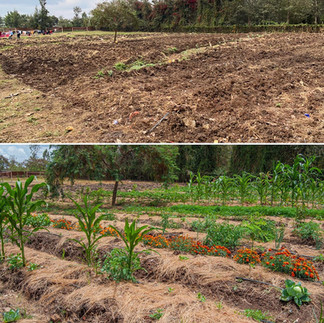Paving the way for a greener future....
- Sheena Shah
- Mar 2, 2023
- 4 min read

We had the opportunity to work with Elimu Fanaka at the start of this year, in setting up their brand new shambas/ farms and revamping the existing areas to ensure that we were all paving the way to food freedom. Kazi Mghendi first met Sheena during a fellowship programme that they were both on and learned about each other’s work. Kazi, a determined force, passionate about community development and enthusiastic about improving education standards in public primary and elementary schools approached Sheena and Harvesting for Good EA to talk about how to integrate permaculture within their existing programme. She is the Founder of Elimu Fanaka, is a non-profit organization working with rural public primary schools in Kenya to improve access to quality education and ultimately create sustainable communities.
Just as she views schools as centres for change and believes that education can be utilized as a tool that can bring positive transformation to underserved communities, HFG EA believes in the exact same model of approach. We invited her to visit one of our ongoing projects at the Ruiru Rehabilitation Centre where we have created a permaculture model to showcase what can be achieved. Her work very much aligns with the work in Ruiru and this was a perfect example for her to interact with. We went around the development which excited her once she realized how much transformation the land has gone through to become what it s now in a SHORT amount of time and that it would be ABSOLUTELY possible for their school in Voi to achieve the exact same result.

Elimu Fanaka already has a functioning club under Arts & Culture which was a perfect foundation to include permaculture and gardening as part of their activities. This club, Klub Ujuzi (“Ujuzi” is a Swahili word for “Skill”), is a children’s table banking and mental health & wellness club, designed for school-going children aged 10-14 years (grade 4 to class 8) in rural public primary schools in Kenya to train and empower them on income-generating activities and support them in improving their mental health and wellness and gain financial literacy at an early age. Including permaculture and farming, this would encourage the club to get outside and connect with the environment, understand how food is grown and combat food insecurity and malnourishment. We know that a well nourished child can excel 100% and this sets up the successful path that we ought to see them go towards and flourish. The idea is to promote diversity not only on the farms but also on their plates. A healthy brain can only thrive through a colorful plate of super nutritious food.
We started with mapping out the land in Voi where our staff spent a few days understanding the history of the land and thinking about the best way to set up a functioning shamba at the Mbulia Primary School and would be easily maintained, whilst producing an abundance of food. The gardeners were part of this entire process, understanding this way of farming and going away from the conventional way of doing things. Ideally the children would be part of the process, giving them insight into how their food is grown and how they look after it. Maintenance is absolutely key for a successful and thriving garden. The adults and children feel empowered to share this knowledge back home and with their peers so that we start a movement of such an important shift and really appreciate our food systems more. This is the absolute goal.
In just a week, a shamba is reborn and a shade house is constructed! A variety of seeds, plants and trees are carefully selected, ensuring that we are growing what will be mostly used and introducing a new selection to improve on the existing, so that we are contributing to a diverse system that pays it forward. This is the most pivotal stage so that the gardeners are learning how to grow food using the different techniques and principles borrowed from permaculture and biointensive methods which will regenerate soils, increase diversity through mixed crop systems and decrease pests in the long whole.

Two months in and the shambas are looking good with a small percentage of loss due to the weather conditions and a huge percentage of success. Now, keep in mind, we are in a very dry climate here and we are closer to the coastal region too and it is HUMID. We are also close to wildlife territory which means, we are prone to elephants stomping their way through and there can be some obstacles. The site is constantly learning and it is exciting. We did set up a drip kit thanks to our partners at Fluid Farming which helps in water maintenance long term but there is a need to keep soils covered which we are now encouraging more and more so that we can retain all of the nutrients and keep moisture intact. This keeps maintenance of shambas much more manageable which is what we want. The images below are from the project and it tells us a story of what is happening.


We are hoping to visit the project in the next few months to check on things but we are happy to be receiving updates periodically to help the project manage any challenges but to also stay in the loop.
Thank you to the Elimu Fanka Initiative and Mbulia Primary School for trusting in our work and setting an example for others schools and communities to take this step in creating a greener future. It is what we want to be doing and be part of.



















Comments